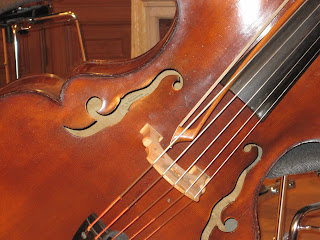I've said I am working on the oboe concerti. I have received pdf files of four concerti (Graun, Heinichen, Reichenauer, and Ristori) that have been input from the MSS (manuscripts). And just a few days ago, the Professor gave me (finally!) copies of the MSS from which the pdfs were produced, so I can check for errors and make suggestions where I feel there are discrepancies or "typos" in the originals. The pdfs I have are copies from when they were input on Finale, a music program that we're actually not using. We're using Sibelius now, and I hope to get the experts in such things to transfer the oboe concerti (not to mention the bassoon concerti) to Sibelius so I can directly edit them if need be.
So I'm sitting at the piano, playing through the pieces slowly and repeatedly, and seeing what I think. In the case of one of the Reichenauer concerti, for example, I don't think it's as good a piece as the other one by him that is included in the collection of MSS. So here, I plan to suggest that the better one (F major) replace the less good one (B-flat major) in the set of four concerti to be published. I am inputting the F major into Sibelius, and have done two of the three movements so far. I'm getting better and faster at using the program, and it's not that hard. The fine points of things like formatting and producing individual instrumental parts are harder to learn. The program is phenomenally complete -- you can do anything with it. Want to write a duet for whistler and quintfagott? It will set up the score and make sure you keep within the limitations of both "instruments," then play the piece back with appropriate synthesized sound.
The Professor is showing up at school more and more often as his broken ankle is improving. That has slowed him down a lot and delayed much of my collaboration with him. I'm trying to do helpful work without much direction and guidance. He promises to sit down with me soon as things get back to normal, so we can discuss details. One thing I need to be doing, with a March 1 deadline, is to write an article for the Journal of the International Double Reed Society on the subject of Dresden double reed concerti of the late baroque, and the new publications we're working on. Did I mention that the "publication" is intended to be online only? As I understand, the music will be available to everyone at no cost on line. I guess one would need to print it as needed for practice and performance.
Another question I have brought up once, and need to follow up on, is the idea of producing piano reductions of the orchestra parts. All soloists need to be able to run through the music with piano, and expect a piano reduction to be available. When one buys the music to a concerto, it always comes with a solo part and a piano part. As far as I know, this has not yet been a part of the project, and I will argue for it. Once more, Sibelius to the rescue. It is apparently possible to produce a reduction of orchestra music using the program, though I haven't yet learned how. And fortunately, the orchestral scores are for the most part quite simple -- two violin parts, viola, and continuo. Only one concerto that I have seen has any orchestral winds at all.
 |
| Schloss Albrechtsberg |
Till next time.


No comments:
Post a Comment